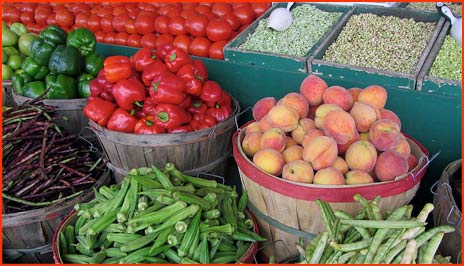
Last time, Childhood Obesity News mentioned the Farmers’ Market Promotion Program (FMPP), a government bureaucracy designed to pass out federal money to programs that promote farmers’ markets, roadside fruit stands, and other such vending sites. It has other concerns too — equipment purchase, delivery, transportation, consumer education, classes in business savvy for farmers, green technology, waste management, and any other area of agriculture that can get more fresh food into the hands of more low-income people.
As an example of success, the Department of Agriculture points to the small Mississippi town of Cleveland, where two acres of land have been donated for a farmers’ market. With a grant from the FMPP, the locals were able to upgrade the equipment, attract more vendors and more customers, and keep the venue open for more weeks out of the year.
Of course, in such cases, debunking is never far behind. For Wellsphere, John R. reproduced Jones’s article and commented that the existence of food deserts is a claim and not a fact, “just another bit of Leftist mythology.” In his view, the whole idea of making sure fresh food is available to all Americans is based on an elitist notion and a bunch of unwarranted assumptions. He believes, for instance, that all inner city neighborhoods are served by small ethnic food shops that are willing and able to supply fresh produce if there is a demand. John R. says of the First Lady:
Mrs O, however, seems to have transmogrified the concept of a food desert into the absence of a supermarket, showing a grasp of reality that is every bit as shallow as her husband’s… The idea that supermarkets are a source of fresh food is just supermarket propaganda. Some fruits and vegetables keep well in cold storage and apples (for instance) on sale in a supermarket can be a year or so old!
Susan Jones noted that the FMPP had $10 million to work with in 2011, which was twice as much as the year before. Then, in 2012, the national budget gave them another $10 million. Some people think this was too much. This summer, something else went on that was indirectly related to the promotion of farmers’ markets. The Environmental Working Group (EWG) describes itself as:
[…] perhaps best known for its groundbreaking and debate-changing farm subsidy database. With over 170 million searches since 2004, EWG’s farm subsidy database tracks recipients of 90 million government agriculture program checks and has shaken up the debate over continuing wasteful subsidies to big agribusinesses.
Last month, EWG members Kari Hamerschlag (food policy analyst) and Don Carr (Senior Communications and Policy Advisor) collaborated on an article shining a light on the proposed cuts to SNAP, the Supplemental Nutrition Assistance Program that a lot of Americans still call by the familiar name of “food stamps.” It seems the House Agriculture Committee wanted to take $16 billion out of that program, and the growers of fruits and vegetables estimated that they would lose out about $3.2 billion worth of business.
Why was the government, with one hand, taking away $3.2 billion worth of potential business from small farmers by cutting down on aid to indigent families, and with the other hand giving a lousy $10 million to support farmers’ markets? More unfortunate is the news that only about 20% of SNAP benefits are spent on fruits and vegetables. It’s a sad commentary on the failure of some other aspect of the administration to function effectively.
The Specialty Crop Farm Bill Alliance and the United Fresh Produce Association and similar trade organizations have given lip service to a commitment to increase the consumption of vegetables and fruits by American students. Hamerschlag and Carr ask:
Will they make good on their ‘commitment’ to encourage kids to eat more fruits and vegetables? Or will they support programs that benefit their bottom lines (such as specialty crop block grants for marketing and research) but do little to address the childhood obesity epidemic? Common sense reforms to the bloated crop insurance program would produce more than enough savings to pay for both — research funds for the fruit and vegetable industry and healthy food for needy kids. Ending subsidies to crop insurance companies would nearly save enough money to meet both important priorities.
Your responses and feedback are welcome!
Source: “USDA Spending $10 Million to Promote Farmers’ Markets in Michelle Obama’s ‘Food Deserts’,” CNSNews.com, 06/06/11
Source: “USDA Spending $10 Million to Promote Farmers’ Markets in Michelle Obama’s ‘Food Deserts’,” Wellsphere, 06/08/11
Source: “Farm Bill Pickpockets,” EWG.org, 07/05/12
Image by NatalieMaynor.

 FAQs and Media Requests:
FAQs and Media Requests: 











